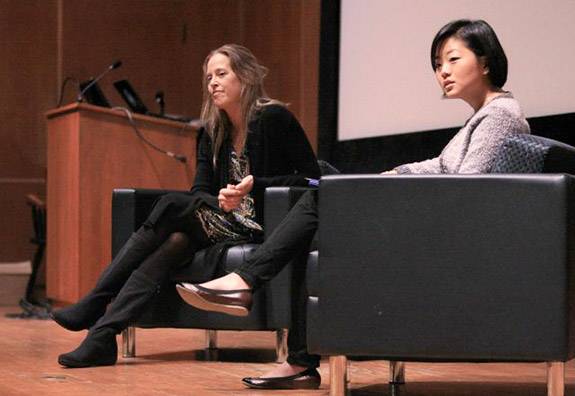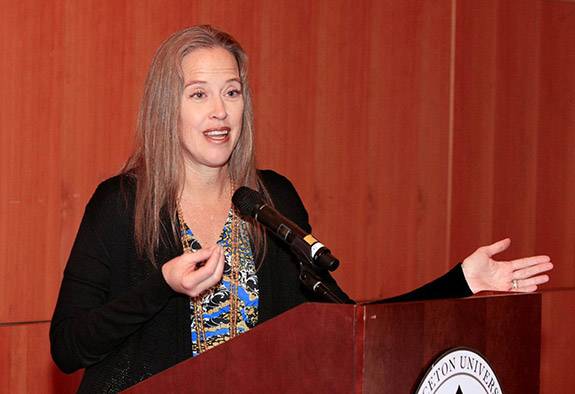On Monday, Feb. 9, Wendy Kopp, founder of Teach for America (TFA) and a member of Princeton's Class of 1989, shared her thoughts on the pressures facing the most vulnerable students in the United States and how to work to equalize the national education system. The public talk was organized by the Pace Center for Civic Engagement, Community House, the Undergraduate Student Government Committee on Diversity and Institutional Equity, and Teach for America.
Seated on stage in McCosh Hall, Room 10, with Princeton senior Janie Lee, who moderated the afternoon's conversation before a crowd of more than 100 students and campus and community members, Kopp started by putting her work at TFA in context with the larger picture of educational challenges in the United States.

Wendy Kopp (left), founder of Teach for America and a member of Princeton's Class of 1989, and moderator Janie Lee, a senior, listen as an audience member asks a question during a public lecture on U.S. education and the opportunity gap on Monday, Feb. 9, in McCosh Hall on the Princeton campus. (Photos by Frank Wojciechowski)
"We're tackling what I think is this country's greatest failing and biggest problem," said Kopp. "We aspire to be equal opportunity, but all across the country where a student is born, their race, their class affect where they end up. [At TFA] we view this as a systemic issue and channel our greatest resource as a country — our people — to make sure our marginalized youth have the chances they deserve."
TFA hires college graduates to teach for two years in low-income schools across the United States. The organization started as a product of Kopp's senior thesis, which explored how to create a national teacher corps. Over the past 25 years, TFA has enlisted more than 47,000 people to teach in some of America's neediest urban and rural schools and helped inspire similar organizations in 34 countries, which now make up a global network called Teach for All.
While recent news reports have cited a decline in college applicants to TFA and critics have argued that the organization provides a temporary solution by employing teachers for only two years, Kopp was optimistic about the work being done and emphasized that closing America's opportunity gap won't just happen in the classroom.
"It's not just about two years," she said. "It's about every year thereafter. … We have alums in finance, technology, medicine and law. Some stay in the classroom, but others start new social enterprises, tackle policy and join the public sector. We need to think broadly to keep going."

Kopp speaks to University students and campus and community members at a private reception at the Fields Center.
Audience questions spanned from thoughts on personal volunteerism to larger questions about whether the U.S. education system pits honing academic skills against encouraging extracurricular interests. Dee Luo, a junior and co-leader of an upcoming Breakout Princeton spring break trip examining post-secondary education, asked whether Kopp felt everyone should be striving to go to college.
"Just getting to college proves nothing," Kopp said. "We need to think about getting to and through college. How we can get students on a path to a career and civic engagement to realize their full potential. … We need to focus on making sure our lower-income students have the same options as our economically privileged members of society."
When asked how University students could connect with children or community members unlike themselves while volunteering, Kopp emphasized the importance of deeply understanding community history and community dynamics. "It's about exploring the nature and roots of inequity and understanding how our own views, our own paradigms, limit us in helping our kids maximize their potential," she said.
At the institutional level, Kopp encouraged students to "step back, reflect on and challenge" inequities that they see, asking students to keep in mind the University's unofficial motto, 'Princeton in the nation's service [and in the service of all nations]'.
Overall, Kopp stressed that for America's most-challenged students to be successful, a strong mindset, access to broader networks and experiences, and critical consciousness — an understanding of personal history, identity and "why things are the way they are" — are essential.
"Research shows that whether you are low-income or not, mindset is a bigger predictor of success than academic skills, and how students gain great academic skills and persevere in the face of challenges," Kopp said. "Mindsets, skills and leadership, experience and access, and critical consciousness — we need all four of these things for our students to be the leaders, people and citizens we want them to be."
After the lecture, Kopp joined University students and members of the community at a reception at the Fields Center where she talked one-on-one with attendees and encouraged everyone to be actively engaged.
Junior Adaure Nwaba, a volunteer at Community House where Kopp visited with middle school students taking part in afterschool enrichment earlier in the afternoon, appreciated Kopp's inspirational messages.
"It was really powerful to hear how we can extend a deeper impact in the lives of children here at Princeton and beyond," Nwaba said. "To remember that it's not just about access to a quality education, but about social equity too."
Senior Shawon Jackson, outgoing president of the Undergraduate Student Government, agreed. "One of the main reasons we were excited about this event was to engage students in a conversation about social inequity in and out of the classroom," he said. "I'm glad Wendy shared that it's never too late to enter the classroom and that you can promote social justice whether or not you're a teacher."
"People are everything," Kopp concluded. "Let the tech firms and consulting firms build your skills, but be sure to ask yourself, 'Am I maximizing my impact?' 'Am I living up to my values?'"




